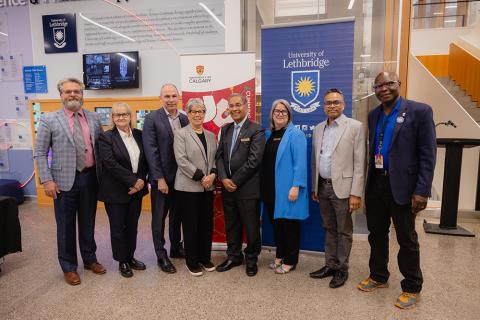
Southern Alberta Medical Program
A Partnership Between the University of Lethbridge and the University of Calgary
About the Partnership
The Southern Alberta Medical Program (SAMP) will train undergraduate medical students at the University of Lethbridge and in rural communities across southern Alberta. It is one of two Rural Medical Education Program Training Centres in Alberta. Learners will train alongside other health-care professionals, gaining practical medical experience. The program will enrol learners who are identified as being likely to practice in rural areas upon graduation. Training these future doctors in southern Alberta will improve the availability of physicians in rural Alberta in the future.

In the news
Cormican scholarship award the first to support growth of new Southern Alberta Medical Program
UNews - University of Lethbridge - Jan. 23, 2025
SAMP a unique partnership with much promise
Lethbridge Herald - Dec. 19, 2024
Local doctor named Regional lead of new medical program at U of L
Lethbridge News Now - Dec. 3, 2024
Lethbridge doctor named regional lead
The Southern Alberta Medical Program has reached another significant milestone as it prepares for its first cohort of undergraduate medical students, naming Dr. Richard M. Buck, MD, as the program’s regional lead.
Dr. Buck practices in Lethbridge within the Emergency Department of Chinook Regional Hospital and is an assistant clinical professor of Family Medicine at the University of Calgary and the University of Alberta.
Our Journey
January 2023
Alberta government invests $1 million in the Universities of Lethbridge, Calgary, Alberta and Northwest Polytechnic to support the feasibility study of rural medical education programs.
April 2024
Alberta’s Advanced Education Minister announces capital and operational funding to establish two Rural Medical Education Program Training Centres (at the University of Lethbridge and at Northwest Polytechnic in Grande Prairie).
May 2024
University of Lethbridge and University of Calgary sign a Memoradum of Understanding (MOU) to formalize the partnership and jointly deliver the medical training program.
Why This Initiative Matters
Access to a family physician is incredibly challenging for many families in small- to mid-sized centres across Alberta —particularly for rural and Indigenous communities. Research shows that recruiting learners from small communities and rural areas and training them in these locations leads to more doctors choosing rural practice. The program will allow Alberta to train more local physicians, with the training centres also expected to help attract doctors who are interested in teaching learners.
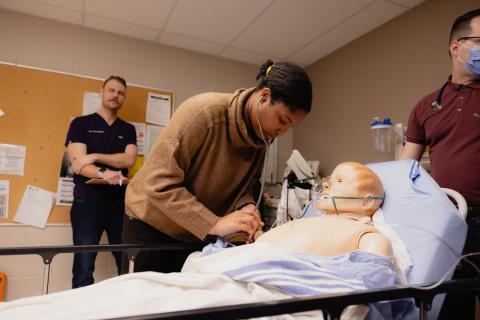
How the Program will Work
SAMP will use a distributed medical education model. The University of Calgary’s curriculum will be adapted to capture the local context of regional and remote health care to be delivered in partnership with the University of Lethbridge. Soon, learners will attend classes in Lethbridge and will learn from preceptors located across southern Alberta.
Frequently Asked Questions
Voices of Support
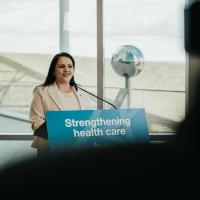
The research and data show that when students train in rural locations, they are more likely to stay and work there. Alberta’s government is proud to support this partnership between the University of Lethbridge and the University of Calgary that will ensure rural medical training opportunities are available for students.
Hon. Rajan Sawhney
Minister of Advanced Education
Government of Alberta
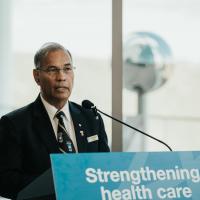
Access to a family physician is an incredible challenge for many families in small- to mid-sized centres across southern Alberta – including rural and Indigenous communities. Building a program that recruits local students, and trains them in areas across southern Alberta, will lead to more doctors practicing in those areas for decades to come.
Dr. Digvir Jayas
President and Vice-Chancellor
University of Lethbridge

We’re excited about this important program expansion between the University of Calgary and the University of Lethbridge, which will open more doors of opportunity to attract, educate and retain the health workforce that is greatly needed in rural areas. The collective efforts of this post-secondary network will help to deliver quality health care and continuity of care across our province for years to come.
Dr. Ed McCauley
President and Vice-Chancellor
University of Calgary

We all have a role in addressing challenges, such as rural doctor shortages. A collaborative physician-training model that considers the needs and contributions of our community, will continue to ensure Lethbridge a welcoming place to all who study, work and live here.
Blaine Hyggen
Mayor, City of Lethbridge
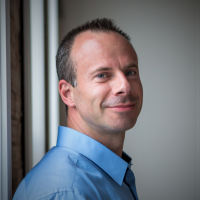
The number one thing that draws people to Lethbridge is quality of life. If you’re not well and if you can’t access primary healthcare, then quality of life comes into question. Making sure there are practitioners here to serve everyone is critical to the success of our community.
Trevor Lewington
CEO, Economic Development Lethbridge
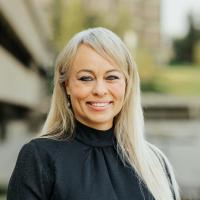
In addition to providing opportunities for local students, this program is going to attract students to Lethbridge who will make important contributions to our region. This initiative isn’t just about people taking care of people; it’s about building community.
Cyndi Bester (BMus '95, MEd '01)
CEO, Lethbridge Chamber of Commerce
